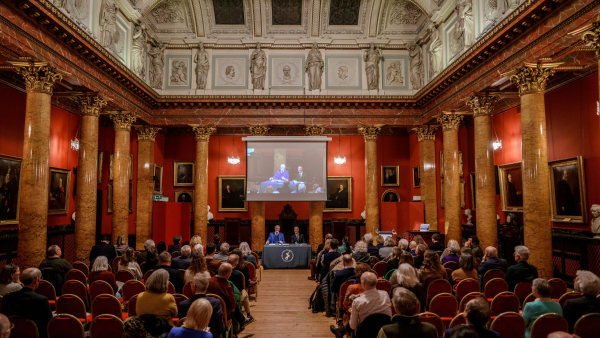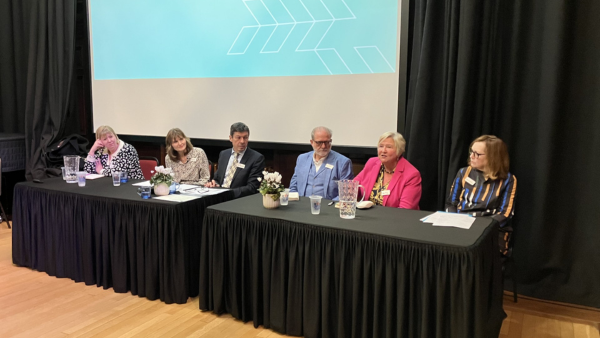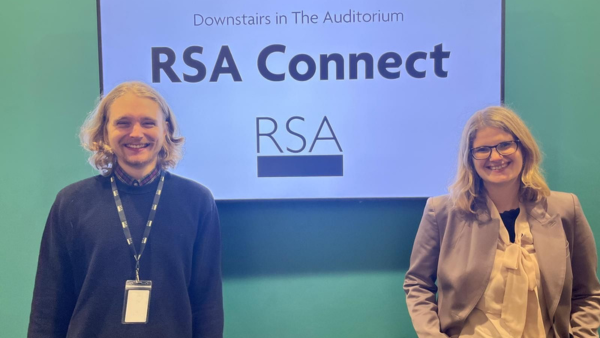Inspired by the recent edition of the RSA Journal focusing on cities and place, a group of RSA Fellows based in Finland convened in November 2019 to discuss urbanism and its challenges. Amy Skogberg FRSA shares bitesize reactions and insights from this dynamic panel discussion, which included prominent experts on sustainability and urban issues.
The panel was moderated by Thomas Jelley FRSA, who has spent the last decade working with corporate responsibility, in areas such as environmental sustainability and local community engagement.
Panelists included:
- Tuula Antola, director of economic development at the City of Espoo, Finland’s second largest city.
- Leena Alanko, Senior Consultant at Demos Helsinki, a leading Nordic think-tank aiming at building sustainable and fair post-industrial societies.
- Fergal Walsh, a principal architect at Gensler, focusing on solving urban issues and creating design experiences for people living, working and thriving in cities.
Danish architect Jan Gehl argued that: “We definitely know more about good habitats for mountain gorillas, Siberian tigers or panda bears than we do about a good urban habitat for Homo sapiens”. How do you react to this statement?
Fergal: “Well, as the human world is ever-changing it might be harder to keep up with the urban habitat. The cool thing is that Homo sapiens have the capacity to change as the world around us changes”.
Tuula: “Humans are mammals, too, and we want to take care about our loved ones. The basic needs of people are all the same and should be kept in mind in urban planning, so that we create networked communities satisfying human needs that are shared.”
Chris Murray suggests that we still have the mind of a village living in the body of a city (RSA Journal 2/2019 p. 10, States of mind by Chris Murray). Do you agree?
Leena: “As Fergal mentioned, we have the capacity to change and we get used to different environments. But we should consider how to make the community thrive not only from a city angle, but also on a neighbourhood and micro-community level”.
Tuula: “I agree with Leena, cities usually have many centres with smaller ‘villages’ or communities, which is also a more sustainable way to build cities”.
Professor Tim Kendall, NHS England’s National Clinical Director for Mental Health argues that we should create places that could have a positive therapeutic effect; instead of ‘care in the community’ we might create ‘communities of care’ (RSA Journal 2/2019 p. 13, States of mind by Chris Murray). Is this vision realistic?
Tuula: “There are different factors that bring people together and make them feel that they belong, which increases mental health. It is not enough to be included in a network, but you must feel a sense of belonging. The ‘village’ experience that we spoke about earlier is vital. You can belong also to a small part of the city, people are often proud to be from a specific neighbourhood”.
Fergal: “If we design proper places people will feel better and will treat each other better, as well as treating the spaces better. A great example is the Goldsmith Street project in Norwich City that won the RIBA Stirling Prize 2019. Each house has got a front door and big lobby space for prams and bikes as well as a private balcony. The back gardens share a secure alleyway for children to play, and a landscaped walkway for the community runs through the middle of the building. Parking is only done in the outer edges, making sure that people and not cars own the streets.”
Leena: “Digital solutions can bring mental wellbeing to the community: Helsinki has for example got an awesome digital app called Nappi Naapuri (meet your neighbour). Its mission is to increase real life connection among people who live close to each other. The app is designed for neighbours to help each other, establish social connection as well as to drive the sharing economy”.
American psychologist and researcher Patricia Greenfield has found a fundamental shift from a collaborative way of thinking to a more individualistic mindset. The changes correlate precisely to rising levels of urbanisation (RSA Journal 2/2019 p. 14, States of mind by Chris Murray). How can we be more explicit about the way we collaborate?
Fergal: “It’s easy for humans to be lazy, and easy to be anonymous in a big city. We must design for cities, areas and buildings to be inclusive. Only when we do that can we create the necessary prerequisites for meaningful connections and collaboration”.
Tuula: “Cities must enable a good, happy and healthy life. We need new platforms and tools for bringing people together and collaborate, such as the Nappi Naapuri app that Leena mentioned earlier. Another great example is Urban Mill, which is a community at Aalto University campus in Espoo, Finland. It is a hub for developing new digitally-enabled service concepts, bringing together urban developers, citizens and other users of the urban environment.
Leena: “We cannot only invite people to join networks, but we must go where they live and work to try and understand their needs and create what they desire in order to collaborate. I see that this is especially true for millennials who want to feel that they belong and are part of a community”.
Related news
-
The 2024 Angus Millar Lecture
Fionna Monk
The 2024 Angus Millar Lecture was led by award-winning novelist Andrew O’Hagan on the theme of 'Art, Literature and Truth in the Era of Fake News, Algorithms and Artificial Intelligence'.
-
Facing the future: Scotland's challenges
Fionna Monk
On 26 November 2024, RSA Scotland discussed Scotland’s future with nine engaging speakers addressing various challenges facing the country. The venue was resonant – a former committee room at the French Institute used in its early days by the Scottish Parliament. This successful event was chaired with deftness and humour by the former Presiding Officer at the Parliament, Rt Hon Ken Macintosh.
-
Strengthening Fellows' global and local connections
Line Kristensen Fionna Monk
From our online global community platform Circle to enhanced local co-working spaces and personalised communications, we’re doing all we can to facilitate engagement with the RSA.



Be the first to write a comment
Comments
Please login to post a comment or reply
Don't have an account? Click here to register.